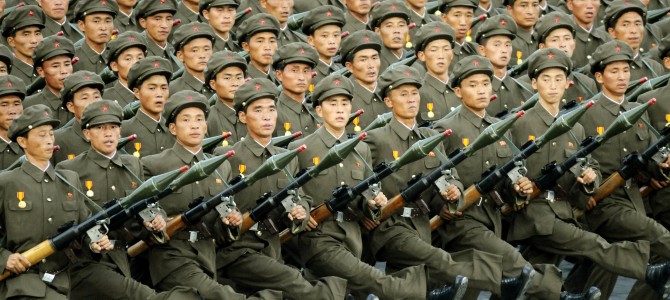
Kim Jong Un has removed a major obstacle to negotiations with the United States, according to South Korean President Moon Jae In, but as President Trump prepares for a highly anticipated summit meeting with the North Korean dictator, it would be wise to pause for a reality check.
“The North Koreans did not present any conditions that the United States could not accept, such as the withdrawal of American troops in South Korea,” Moon said optimistically, adding: “They only talk about an end to hostilities against their country and about getting security guarantees.”
It is tempting to interpret this to mean that North Korea might be willing to give up its nuclear weapons without U.S. troops having to leave the Korean peninsula, but it’s important not to get too carried away. To begin with, Kim is simply saying that U.S. troop withdrawal is not a precondition to any negotiations about denuclearization. That doesn’t mean that the North wouldn’t make it a condition for denuclearization during negotiations — a demand they have made as recently as 2016.
And if what Kim Jong-un wants is an end to hostilities against his country and a security guarantee, it’s hard to see — from his point of view — how those conditions would be met with 28,000 U.S. troops on his border.
If security is paramount for Kim, nuclear weapons might be his only hope of staving off regime change. After all, Saddam Hussein did not have nuclear weapons and Muammar Gaddafi gave up his nuclear ambitions. Both were on the receiving end of U.S.-led regime change. The latter is probably a telling lesson for Kim, because Gaddafi was given a security guarantee in return for giving up on Libya’s nuclear program.
And while denuclearization would be welcomed, it is not a necessary condition for U.S. national security. Even if North Korea eventually acquires — or even has now — the capability to strike the U.S. homeland with a long-range nuclear weapon, Kim would still have to acknowledge the reality of the vastly larger and superior U.S. strategic arsenal and the inevitable logic of deterrence. He would have to be suicidal to attack the U.S., knowing that we could respond with utterly devastating force that could result in his death and the total annihilation of his country. That would be contrary to what the Kim dynasty has repeatedly demonstrated: that its larger interest is its own survival and the perpetuation of the regime.
It is important to remember that deterrence worked when the U.S. and the Soviet Union had thousands of warheads pointed at each other, and that irrational leaders with nuclear weapons — irrational leaders such as Josef Stalin and Mao Zedong — were successfully deterred. And deterrence will work with Kim as well. If they could be deterred, so can Kim Jong Un.
In fact, North Korea has had nuclear weapons for at least a decade and has not used them against either South Korea or Japan, presumably because the threat of a U.S. nuclear response hangs over Pyongyang’s head. This is evidence that Kim Jong-un understands deterrence.
If we know deterrence has worked and will continue to work, there are some other important things we need to understand. First, military threats are unlikely to change Kim’s mind. It is much more likely to reinforce his belief he needs nuclear strike capability to ensure his regime’s survival.
Second, we must understand that the more we threaten the use of force, the more likely the possibility of a miscalculation that leads to war. Also, continually threatening to use military force — and using an all sticks and no carrots approach — pushes Kim into a corner and puts him in a “nothing to lose” situation, if he feels he’s going to be attacked.
Third, even so-called limited attacks against North Korea’s nuclear and missile programs are not likely to be viewed as limited by Pyongyang, especially if tens or hundreds of targets are involved and there is collateral damage with civilian casualties. Even the kinds of military action now taken twice against Syria would carry great risk if replicated against North Korea.
The notion that Kim would sit idly by after being attacked is sheer fantasy. After all, he wouldn’t know if any military action is truly limited or simply the first step to larger military intervention. More likely, such strikes would generate a response that could easily escalate to a wider, larger, and more costly war. A war that would cost thousands, perhaps tens of thousands, of lives — many of them civilians, including Americans living in South Korea.
So if the summit meeting between Trump and Kim isn’t fruitful and doesn’t result in denuclearization, we need to understand that military action should not be and does not need to be the logical next step. Realism needs to guide our actions, which means understanding that the costs and risks of military action against North Korea outweigh the perceived benefits. U.S. national security will be better served by continued deterrence.









